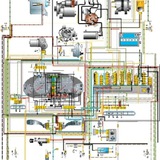Forwarded from Complex Systems Studies
Complex systems in the spotlight: next steps after the 2021 Nobel Prize in Physics
The 2021 Nobel Prize in Physics recognized the fundamental role of complex systems in the natural sciences. In order to celebrate this milestone, this editorial presents the point of view of the editorial board of JPhys Complexity on the achievements, challenges, and future prospects of the field. To distinguish the voice and the opinion of each editor, this editorial consists of a series of editor perspectives and reflections on few selected themes. A comprehensive and multi-faceted view of the field of complexity science emerges. We hope and trust that this open discussion will be of inspiration for future research on complex systems.
📎 https://iopscience.iop.org/article/10.1088/2632-072X/ac7f75
The 2021 Nobel Prize in Physics recognized the fundamental role of complex systems in the natural sciences. In order to celebrate this milestone, this editorial presents the point of view of the editorial board of JPhys Complexity on the achievements, challenges, and future prospects of the field. To distinguish the voice and the opinion of each editor, this editorial consists of a series of editor perspectives and reflections on few selected themes. A comprehensive and multi-faceted view of the field of complexity science emerges. We hope and trust that this open discussion will be of inspiration for future research on complex systems.
📎 https://iopscience.iop.org/article/10.1088/2632-072X/ac7f75
January 17, 2023
s41586-022-05434-1.pdf
1.5 MB
Suppressing quantum errors by scaling a surface code logical qubit by Google Quantum AI
February 25, 2023
March 1, 2023
Forwarded from Complex Systems Studies
April 27, 2023
June 24, 2023
ncomms5213.pdf
653.3 KB
A variational eigenvalue solver on a photonic quantum processor
June 28, 2023
November 5, 2023
November 21, 2023
November 27, 2023
November 27, 2023
November 29, 2023
December 21, 2023
Ento Key | Fastest Otolaryngology & Ophthalmology Insight Engine
https://entokey.com/
https://entokey.com/
Ento Key
Fastest Otolaryngology & Ophthalmology Insight Engine
November 16, 2024
HathiTrust Digital Library – Millions of books online
https://www.hathitrust.org/
https://www.hathitrust.org/
December 8, 2024
BRAINMAPS.ORG - BRAIN ATLAS, BRAIN MAPS, BRAIN STRUCTURE, NEUROINFORMATICS, BRAIN, STEREOTAXIC ATLAS, NEUROSCIENCE
https://brainmaps.org/index.php
https://brainmaps.org/index.php
brainmaps.org
BRAINMAPS.ORG - BRAIN ATLAS, BRAIN MAPS, BRAIN STRUCTURE,
NEUROINFORMATICS, BRAIN, STEREOTAXIC ATLAS, NEUROSCIENCE
NEUROINFORMATICS, BRAIN, STEREOTAXIC ATLAS, NEUROSCIENCE
next generation brain maps and brain atlases
December 19, 2024
Urbanomic Publisher of Contemporary Philosophy
https://www.urbanomic.com/
https://www.urbanomic.com/
January 2
ELIXIR Core Data Resources | ELIXIR
https://www.elixir-europe.org/platforms/data/core-data-resources
https://www.elixir-europe.org/platforms/data/core-data-resources
www.elixir-europe.org
ELIXIR Core Data Resources | ELIXIR
ELIXIR Core Data Resources are a set of European data resources of fundamental importance to the wider life-science community and the long-term preservation of biological data.
January 8
January 8
INIS Repository Search - Home
https://inis.iaea.org/search/default.aspx
https://inis.iaea.org/search/default.aspx
inis.iaea.org
INIS Repository Search - Home
INIS Repository Search provides online access to one of the world's largest collections on the peaceful uses of nuclear science and technology. The International Nuclear Information System is operated by the IAEA in collaboration with over 150 members.
January 8
